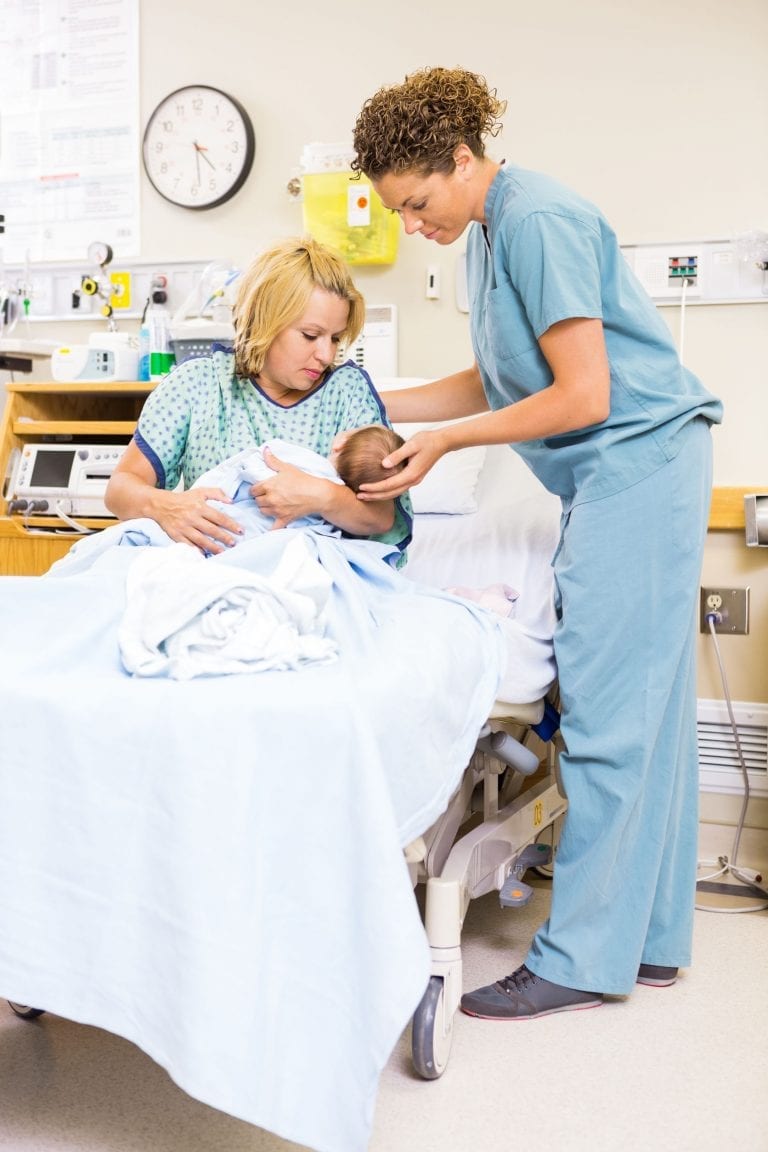This nurse describes finding a designated Baby Friendly™ birthplace as best for you and your little one.
Aren’t all hospitals baby friendly? Well, yes—especially those with birthing centers. But there’s a difference between being baby friendly and Baby-Friendly™ with a capital B, that is.
Getting a Baby-Friendly™ designation means meeting the challenge set forth by the World Health Organization to support breastfeeding, promote skin-to-skin bonding, keep you and baby in the same room and provide excellent care based on your wants and needs as a new mother.
As a labor and delivery nurse who has helped many moms labor, birth and care for their newborns while recovering themselves, I’ve provided many different ways to meet the requests of new moms and little babies. Now that I work at a newly-designated Baby-Friendly™ hospital, I’ve seen firsthand how the differences in these facilities benefit both you and your baby.
I have worked in the nursing profession for 8 years. Providing care to new mothers and their infants never gets old. And now, working at a Baby-Friendly™ hospital, I know that I am involved in providing an incredible environment for mother and baby bond in their first days as parent and child. Here’s what a baby friendly hospital looks like when it happens right:
Get the Baby Friendly Birth Experience You Want
This starts with discussing your desires with your support person, healthcare provider and nurses. Would you like to have a natural birth? Do you plan on breastfeeding? Many things can happen during labor and delivery that are unplanned. A birth plan helps provide some stability in what might be a stressful and unpredictable environment.
Skin-to-Skin Time Immediately After Birth
There’s nothing better for you or baby than going skin-to-skin right after birth. At birth, baby should be placed immediately on your skin, or your partner or support person’s skin. This helps baby transition into life outside the womb by stabilizing baby’s body temperature, blood sugar and heart rate. It also helps you both start breastfeeding. Look for baby’s hunger cues and don’t be surprised when baby’s ready to eat within that first hour after birth!
Get Expert Newborn Feeding Help
The clinical staff in a Baby-Friendly™ birthing center has received extensive training on breastfeeding. They’re eager and ready to discuss the benefits of breastfeeding, support your nursing efforts and also troubleshoot issues you and baby may experience. Our goal is to get you both off to the best possible start. We also educate new moms about delaying bottles or pacifiers until breastfeeding is established, which is typically within 2-3 weeks. If you can’t or aren’t going to breastfeed baby, we’ll provide you with education and support for safely feeding infant formula.
Room Together
We focus on keeping you and your baby together as much as possible. This promotes bonding and helps you become familiar with each other. At home, you will be more likely to be comfortable with noises your baby makes in the middle of the night or his or her jerky movements. Don’t worry, we can provide all of the care you both need right in your room.
Lactation Support After Your Hospital Stay
Most likely you’ll have questions about breastfeeding after you leave the hospital. Baby-Friendly™ hospitals are required to provide ongoing support even after you’re safely back at home. This could be through support groups with lactation consultants available for 1-on-1s or through phone support—something we call a “warm line.” We encourage exclusive breastfeeding until your child is at least 1-year-old, and we’re here with the resources to help you achieve that.
If this sounds like your ideal birth experience and support from your healthcare providers and nurses, here’s what you should remember: As you’re considering who will provide your prenatal care, and where you would like to birth, ask if your practice and birthing hospital or center is Baby-Friendly™ designated, or if they follow any or all of the Baby-Friendly™ practices. This way, you can certainly make the best decision you think will give you and your baby the best start to your life together.
Read: should You Try Labor Before a Planned Repeat Cesarean?






Comments are closed.